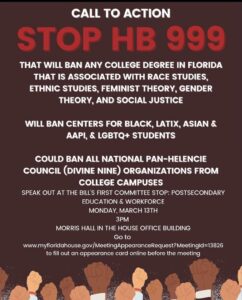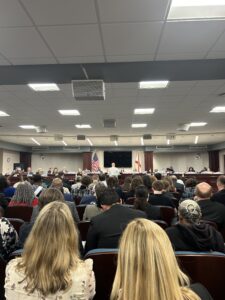
With the new bill proposal underway, residents fear for the lack of equity and inclusion in Florida’s collegiate system. Florida House Bill 999 was introduced to revise the powers and duties of the Board of Governors and enforce requirements for general education core courses. The bill also oversees the overall employment, promotion, and evaluation process for hiring university faculty.
With the approval of this house bill, college degrees in the state of Florida associated with race studies, ethnic studies, feminist theory, gender theory, and social justice will be at risk of termination. The approval would force students currently in these degree programs to relocate or find other areas of study. In addition to the banning of these college degrees, Greek organizations such as the “divine nine,” as well as other cultural centers for Black, Latinx, Asian, AAPI, and LGBTQ+ students, could potentially get caught in the crossfire, ceasing to exist on campus grounds permanently.
Max Fenning, a graduating senior at the University of Florida and the president and founder of the LGBTQ+ education and resource organization “Prism” believes this bill narrows down on a diverse worldview.
“This is an absolute demolition of academic freedom in the state,” said Fenning. “It attacks public education at every angle from the tenure professors to student services in every single capacity.”
Due to the bill’s level of controversy, college students, university officials, and Florida residents traveled across the state to attend the first Postsecondary Education and Workforce Committee meeting in Tallahassee’s capital. Representative Alex Andrade spoke in favor of the bill. Andrade refers to those programs in the bill as opinionated while idolizing the idea that universities should teach students “how to think, not what to think.”

Citizens were also allowed to voice their opinions in front of the board of legislatures. Sending in over 150 appearance cards, two of which were in favor of HB 999 while the rest were in opposition.
But it was residents like Od’Juan Whitfield who felt the demands of the public were not truly met as their chances to voice their opinion was limited.
“They gave us 30 seconds to speak and for those who couldn’t get 30 seconds they were only allowed to declare whether they were in favor or opposed to the bill,” said Whitfield. “That is not what we pay our tax dollars for.”
Amongst those who were able to voice some of their testimonies were different representatives from Florida A&M’s divine nine organizations. Requesting amendments to adhere to greek life while also seeking clarity in the bill’s motives as far as their campus activity is concerned.
Former educator and graduate of FAMU, Dianne William Cox, feels this bill will take an economic toll on Florida’s education system by stopping future students from wanting to attend the university and greek organizations lacking the structure from advisors, as they will fear the potential of losing their job.
“In society, you’ve got to learn to work with other cultures and where best to learn that while you’re working on your degree,” said Cox. “I fear that Greek organizations will lack the participation and the guidance needed for a productive experience.”
With the legislature’s passing of the bill, Tallahassee residents wait to see what the next steps are as they stand armed and ready to take on any obstacle that this bill may bring in their right to pursue educational freedom for generations to come.